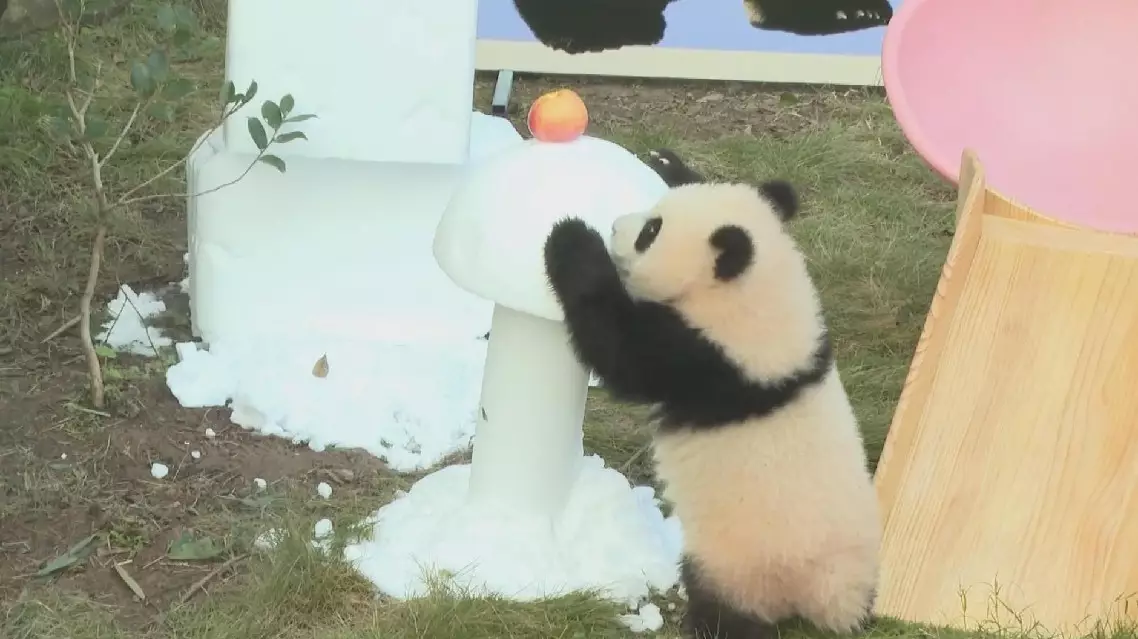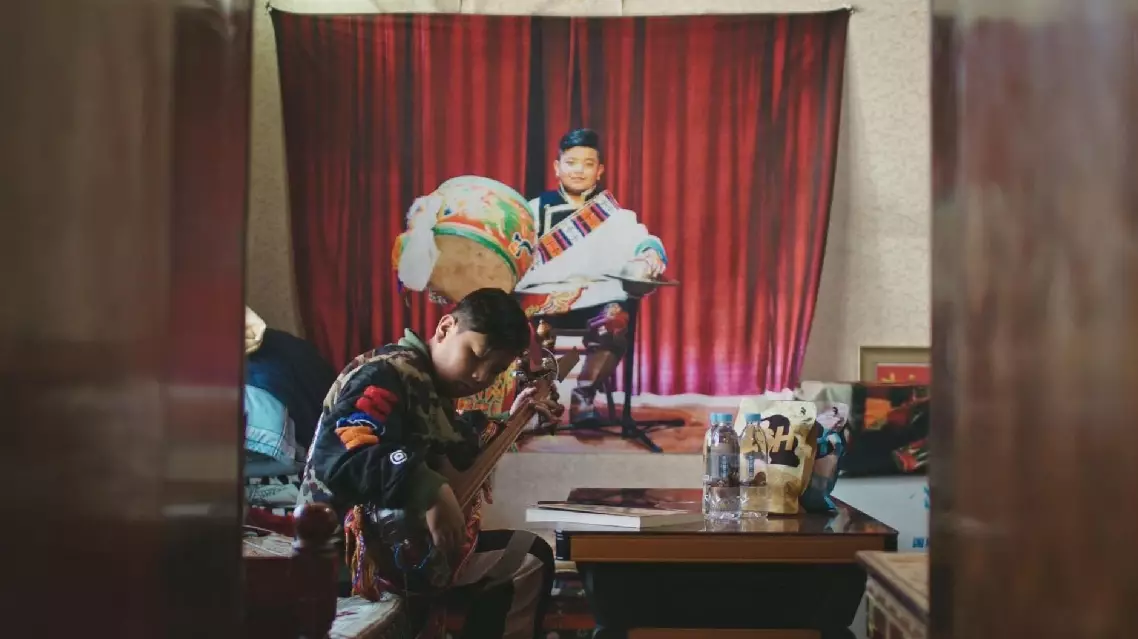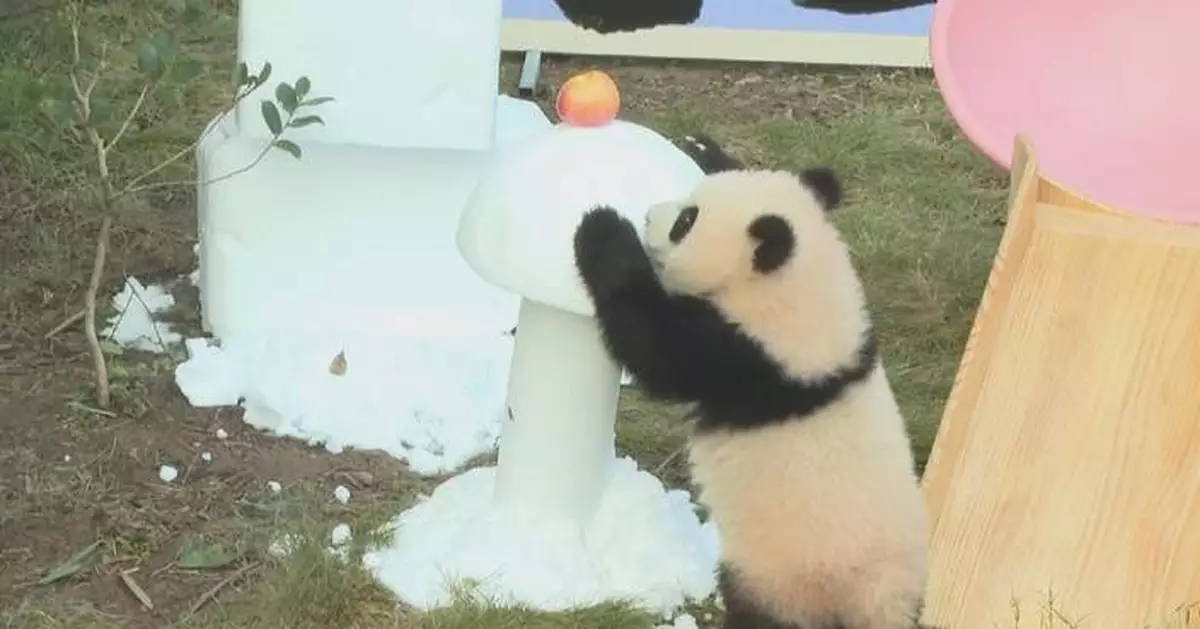Celebrations were held for a giant panda cub who turned six months old on Saturday at a Zoo in southwest China's Chongqing Municipality.
The panda cub was born at Chongqing Zoo on June 28 to mother Haoqi. Zookeepers held a public event to mark the adorable cub's half-year milestone, which started as the cuddly cub tried out a slide that didn't seem very attractive to it. Then, the cub turned to play with a mushroom decoration in the venue which was made with crushed ice.
Zookeepers have also prepared carrots and apples for the cub to feast on.
"I think it's really adorable. I come from Shanghai. This is my first time seeing a panda, and I hope it stays healthy," said Hu Shan, a visitor.
Giant panda Haoqi gave birth to the female cub six months ago after she succeeded in mating with a male panda in the China Conservation and Research Center for the Giant Panda in Chengdu City, southwest China's Sichuan Province in late February.
The cub has been nursed by its mother Haoqi, with assistance from zookeepers. It is growing well, now weighing 12 kilograms.
The cub was Haoqi's second delivery. Born at the zoo in 2013, Haoqi gave birth to a pigeon pair of cubs in 2021 at the zoo. The zoo began to raise giant pandas in the 1960s and to breed giant panda cubs in the 1980s. So far, a total of 32 litters of giant pandas have been born at the zoo.

Chongqing Zoo holds celebrations for six-month-old giant panda cub
With dramyin lute and cymbals in hand and dressed in colorful traditional costume, 17-year-old Tenzin Norbu is among the proud youngsters in southwest China's Xizang Autonomous Region who have been helping preserve the centuries-old Tibetan opera, a multifaceted representative of Tibetan art and cultural heritage. Considered a living fossil of Tibetan culture, Tibetan opera is a comprehensive art combining folk songs, dance, storytelling, chant, acrobatics and religious performance. It was included on the UNESCO Representative List of the Intangible Cultural Heritage of Humanity in 2009.
Tenzin grew up listening to Tibetan opera along with his grandmother. The beat of the drum marked the rhythm of his childhood and quietly planted the seed of a dream.
The teenager leads a youth Tibetan opera troupe and guides his peers onto the very stage they once only dreamed of. He named it "Phudor Youth Tibetan Opera Troupe", because "Phudor" means "dream" in the Tibetan language.
"There are about 24 members in the troupe," said the teenager.
Tenzin once received a very special invitation to perform Tibetan opera for the opening ceremony of an art festival in Lhasa.
Although both their parents and teachers felt it's important for the children to be exposed to traditional culture from a young age, they didn't want it to affect their schoolwork.
The performance they were getting ready for was the first Sweet Tea House Art Festival, the troupe's very first public appearance. It's a rare opportunity for the children -- one too precious for them to pass up. But with their parents growing anxious about preparation for the performance eating into valuable study time, the children opted to rehearse in secret at weekends. Tenzin's family runs a tailor's shop. His father, who is hearing- and speech-impaired, is a superb tailor, while his mother helps him out by dealing with customers. Tenzin enjoyed Tibetan opera with his grandmother during childhood and later learned more about it from his uncle.
"Whenever I'm not feeling good, I'll take out the dramyin lute and the cymbals. When I hear the drumbeat, I get a feeling of elation that's simply indescribable," he said.
When Tenzin finally stepped onto the stage at the festival, he noticed that his parents were not in the audience. "My parents didn't have time to come to see my performance. But they always support me. They work hard every day, also for my sake. So, I'm happy whether they were here or not as long as I can keep performing Tibetan opera," said the youngster, believing that his passion for Tibetan opera will last a lifetime.

Childhood dream takes local boy onto Tibetan opera stage






















































